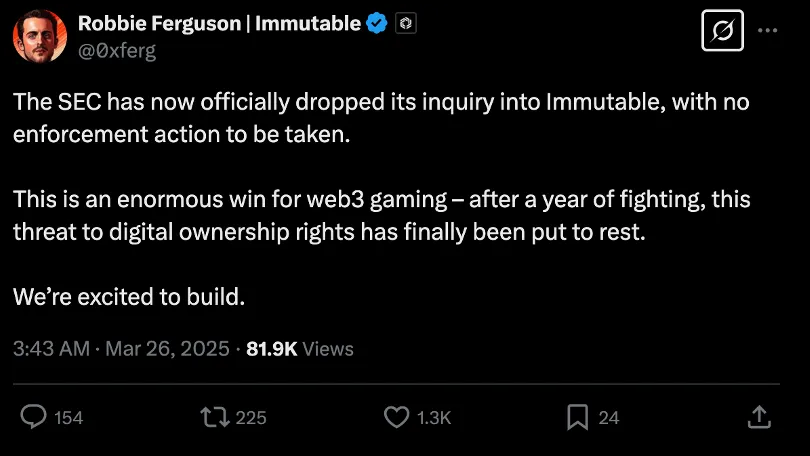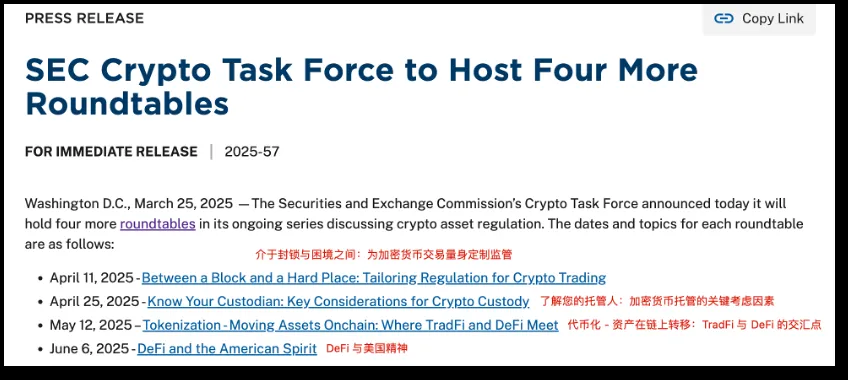In March 2024, the U.S. Securities and Exchange Commission (SEC) concluded its investigations into Web3 gaming giant Immutable and Crypto.com. Both companies had previously received a "Wells" notice from the SEC, indicating potential legal action, but now the alarm has been lifted, ending with "no charges."
Immutable stated that this is a "progress in regulatory clarity," and the pace of "progress" is changing the fate of previously targeted crypto companies by the SEC. Earlier, the SEC reached a settlement with Ripple to return a $75 million fine, putting an end to a three-year legal battle; after the SEC withdrew its lawsuit against Coinbase, the stock price of this publicly traded exchange soared, with the number of compliant tokens launched tripling within two weeks.
This series of actions sharply contrasts with former SEC Chairman Gary Gensler's style of "using enforcement instead of regulation." Several incidents, seemingly isolated, actually unveil the beginning of a shift in the SEC's regulatory strategy—from a confrontational logic of "enforcement equals regulation" to a collaborative framework guided by "rules," with a series of meetings concerning regulatory rules already underway.
Driving this change is the restructuring of Washington's power landscape. The return of the Trump administration is pushing crypto policy toward a historical turning point: Bitcoin is included in the national strategic reserve, national banks are authorized to custody crypto assets, and the "GENIUS Stablecoin Act" is establishing a compliance framework for the industry; Paul Atkins, who holds a crypto-friendly stance, has been nominated by Trump as the new SEC chairman.
The loosening of policies has allowed the keen crypto market to sense opportunities, with traditional financial institutions like Franklin Templeton and VanEck rushing to apply for spot ETFs for crypto assets like SOL, as the wave of institutionalization is visibly reshaping the structure of the crypto market.
SEC "Loosens" Regulations on Several Crypto Companies
As the first quarter of 2025 just concluded, the SEC's regulatory style in the crypto space has quietly shifted—from strict enforcement to cautious balance, with this transformation gradually becoming clear through a series of landmark events.
On March 25, the SEC officially ended its 17-month investigation into Australian Web3 gaming giant Immutable, confirming that the issuance and sale of its IMX token in 2021 did not violate securities laws. This investigation, which began with a "Wells notice" in November 2024 (a warning of SEC enforcement action), ultimately concluded with "no charges."

Ferguson's statement on X
Immutable President Robbie Ferguson stated, "This move brings regulatory clarity to the Web3 gaming industry and is expected to drive more institutional investment."
Immutable is not the only one benefiting from the "loosening."
On March 26, the SEC agreed to return $75 million of the $125 million fine against Ripple, as ruled by the court last year, retaining only $50 million to settle. This long-standing legal tug-of-war ended with a compromise, preserving regulatory authority while sending a signal of easing.
In fact, since the beginning of the year, the SEC has been intensively terminating several controversial investigations, targeting a long list of crypto companies including Robinhood, OpenSea, and Yuga Labs, resulting in either the withdrawal of investigations or suspensions.
In February, the SEC withdrew additional penalties against Kraken's "staking as a service" business (after the exchange paid $30 million in settlement in 2023, the SEC had reserved the right to pursue further action); in March, it reached a settlement with an anonymous DeFi protocol, only requiring it to register certain functions and pay a small fine; even in the area of privacy tools, the SEC dropped securities law charges against Tornado Cash developers, instead collaborating with the Treasury to develop a technology-neutral regulatory framework.
At the same time, the SEC withdrew its lawsuit against Coinbase, causing its stock price to surge 4% in early trading. The market reacted sharply, and within two weeks of the lawsuit's withdrawal, the issuance of compliant tokens skyrocketed. According to data from analysis firm Kaiko, Coinbase added 10 new tokens in February, while the average monthly addition in 2023 was 2.3 tokens, and in 2024, it rose to an average of 3.4 tokens per month.
The deep transformation of regulatory logic is also reflected in the redefinition of emerging fields. In December 2024, the SEC withdrew lawsuits against NFT projects like Impact Theory and Stoner Cats, retaining accountability only for clearly Ponzi-like projects promising returns. In January 2025, the SEC concluded its investigation into former executive Hinman's "Ethereum is not a security" speech, avoiding a new ruling on ETH's status and preserving flexibility in token classification.
Behind this series of actions is the SEC's strategic shift from "enforcement equals regulation" to "rules guided."
On January 21 of this year, the SEC formed a special cryptocurrency working group, led by the commission's acting chairman Mark T. Uyeda, aiming to gather input from industry professionals and experts to help the SEC delineate a clear regulatory path, provide practical registration avenues, establish a reasonable disclosure framework, and wisely deploy enforcement resources.

The SEC held a roundtable discussion on crypto asset regulation in March
On March 21, this working group discussed key areas of crypto regulation under the topic of "defining security," with Troy Paredes, founder of consulting firm Paredes Strategies LLC, moderating the roundtable. The invited experts primarily came from leaders and scholars in law, finance, and venture capital who have participated in the blockchain and crypto asset industry, including several former SEC officials.
Hester M. Peirce, head of the SEC's cryptocurrency working group, stated, "The cryptocurrency working group roundtable provided us with an opportunity to hear from experts about regulatory issues and what actions the commission can take to address these issues."
Various Crypto Asset Spot ETFs on the Way
The turning point lies in the political chess game.
With Donald Trump re-elected as President of the United States, "Bitcoin" has once again entered the public eye as a hot topic, and the Trump 2.0 era vows to establish a more certain crypto regulatory policy.
This "returning" president has changed his previous skeptical attitude toward cryptocurrencies, signing an executive order in early 2025 to "establish a Bitcoin strategic reserve," claiming to convert seized assets into a national digital asset inventory.
At the same time, the U.S. Congress is promoting the "GENIUS Stablecoin Act," requiring stablecoins to be 100% backed by reserve assets and providing a compliance framework for in-game payment tokens, abolishing the SAB 121 accounting standard that hinders traditional financial institutions from custodying crypto assets, and allowing national banks to participate in node validation and asset custody.
The personnel layout of the Trump administration is further reinforcing the shift in crypto policy.
In January of this year, Trump nominated Paul Atkins as the new SEC chairman. Atkins has long advocated for guiding industry development through clear regulatory rules rather than relying on litigation. During his tenure as an SEC commissioner, he frequently criticized the SEC's "enforcement equals regulation" strategy toward the crypto industry, arguing that this approach creates uncertainty and hinders innovation.
As acting chairman, Mark T. Uyeda's advocacy for regulatory loosening aligns with Atkins' crypto-friendly stance. For example, Uyeda terminated lawsuits against Kraken and Coinbase from the Gensler era, and during Atkins' nomination confirmation process, acting chairman Mark Uyeda has already pushed for several policy adjustments, including the establishment of a cryptocurrency working group led by "crypto mom" Hester Peirce, shifting the focus from "catching violations" to "setting rules."
From the president to the SEC chairman, personnel have changed, and the U.S. administrative attitude toward the crypto industry has also shifted, with "regulatory easing" and "accelerated construction" occurring simultaneously.
Following the Bitcoin (BTC) spot ETF and Ethereum (ETH) spot ETF, various crypto assets such as Solana (SOL) and Avalanche (AVAX) have also entered the ETF application sequence, with Ripple's CEO stating that the XRP ETF may be launched in 2025. Traditional financial institutions are taking action, with established asset management companies like Franklin Templeton and VanEck rushing in.
On March 12, 2025, Franklin Templeton submitted an application for a spot SOL ETF, becoming one of the first traditional asset management giants to enter the Solana ETF space. In addition to SOL, the company also applied for a Polkadot (DOT) ETF. On March 25, 2025, the Chicago Board Options Exchange (CBOE) submitted a 19b-4 application for a spot SOL ETF to the SEC on behalf of Fidelity, planning to list it on the BZX exchange.
Grayscale plans to convert its Solana trust fund into a spot ETF, which, if approved, will be listed on the NYSE under the code GSOL, and the application is currently under SEC review. Additionally, companies like VanEck, 21Shares, Bitwise, and Canary Capital have also submitted applications, with the market expecting a probability of over 70% for the SOL ETF to be approved in 2025.
Avalanche (AVAX) has also entered the ETF application queue. In March 2025, VanEck submitted an S-1 application for a spot Avalanche ETF. The SEC has not yet publicly disclosed its acceptance opinion, but the market speculates that its approval pace may reference the SOL ETF, with a key review period expected in the second half of 2025.
The SEC, which has investigative, punitive, and civil litigation powers in the securities regulatory field, is beginning to show a friendly face toward crypto assets, resolving issues left by the previous leadership through settlements, withdrawals, or terminations and suspensions of investigations, and plans to hold meetings this year specifically to discuss the regulation of the crypto asset market.

The SEC will hold four roundtable meetings in the first half of the year to discuss crypto asset regulation
According to official SEC news, four roundtable meetings will be held in April, May, and June this year to discuss crypto asset regulation, covering topics such as specialized regulation, cryptocurrency custody, on-chain transfer of tokenized assets, and DeFi. Each roundtable will be open to the public at the SEC headquarters and will be live-streamed on SEC.gov.
With the loosening of U.S. policies combined with the intensive entry of traditional financial institutions, crypto assets have transitioned from "marginal experiments" to a historical turning point of "mainstream introduction," ushering in an era of dynamic balance between "regulation and innovation."
What do you think the SEC's change in stance will mean for the market?
免责声明:本文章仅代表作者个人观点,不代表本平台的立场和观点。本文章仅供信息分享,不构成对任何人的任何投资建议。用户与作者之间的任何争议,与本平台无关。如网页中刊载的文章或图片涉及侵权,请提供相关的权利证明和身份证明发送邮件到support@aicoin.com,本平台相关工作人员将会进行核查。



